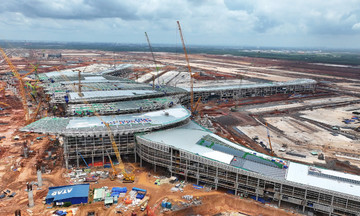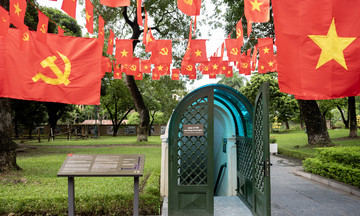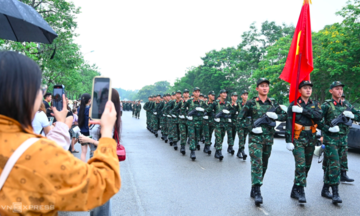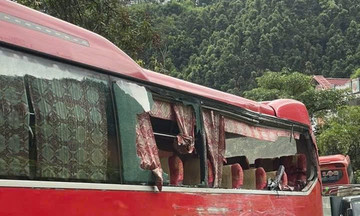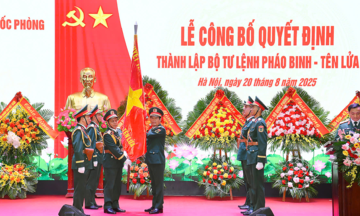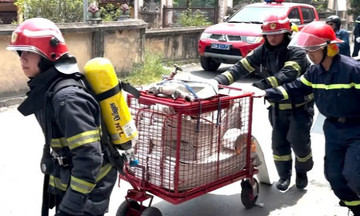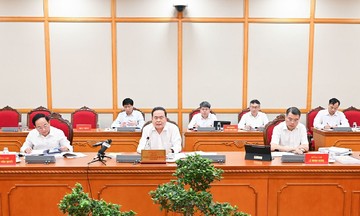Speaking at the conference on the morning of 13/8, Mr. Mua A Thi recounted how Hang Pu Xi village nestles at the foot of a mountain, perpetually shrouded in clouds. Previously, the only access to the village was a dirt path: dusty in dry weather and muddy during rain, making it impassable for vehicles. The villagers primarily relied on corn and rice fields, raising chickens and pigs, which provided enough food but not enough clothing. On days of heavy rain, the streams would swell, preventing children from crossing the bridge to attend school.
Thanks to the national target program, village life has dramatically improved. Paved roads now reach every doorstep, electricity powers every home, and phone and internet services are now available. Children attend school regularly, and clean water is accessible to everyone. Many poor households have received support to build new homes, eliminating the worry of leaks during the rainy season, and the poverty rate has significantly decreased.
However, on the morning of 1/8, a devastating flood swept away many houses and crops. Numerous families lost everything, leaving a thick layer of mud covering their homes, gardens, and roads. The flood left behind a lingering fear and a heavy burden of damage on the villagers.
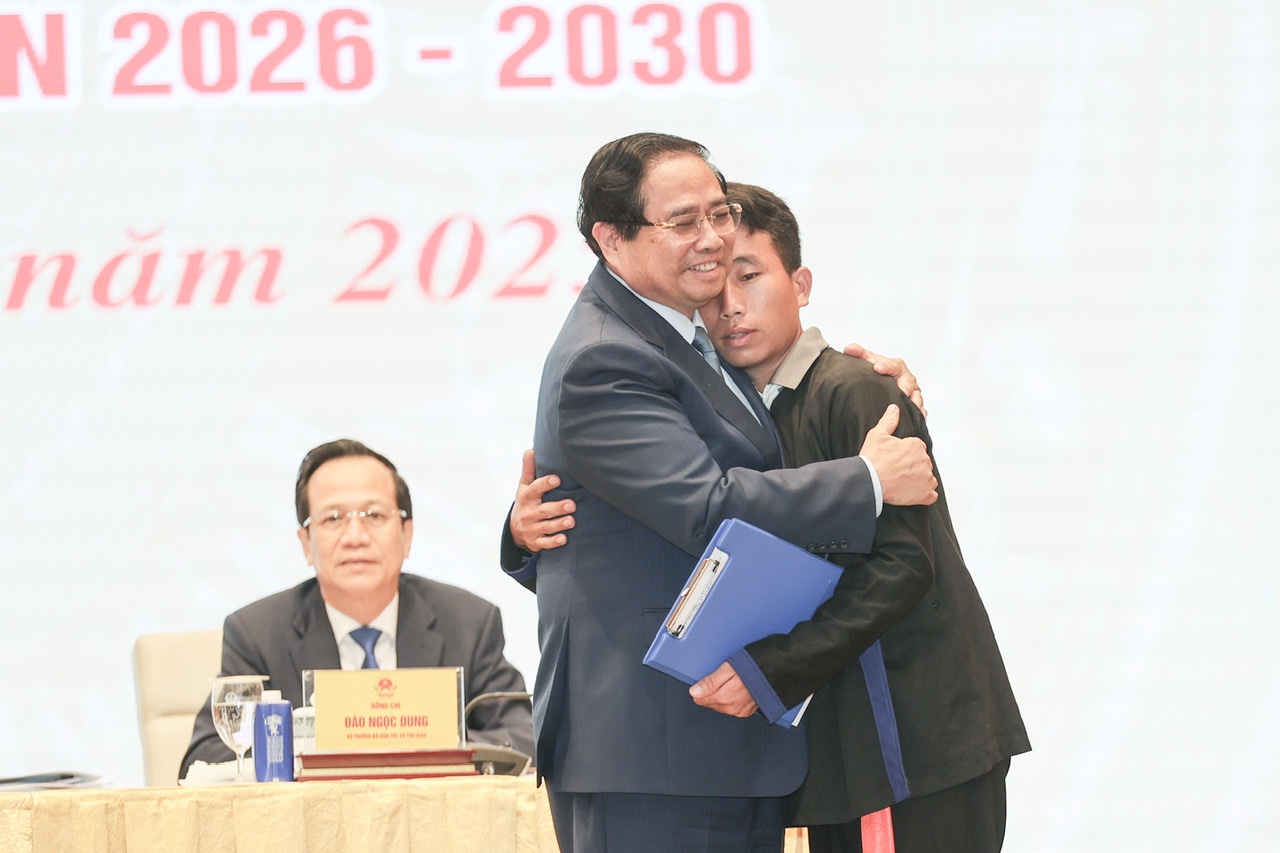 |
Prime minister Pham Minh Chinh embraces village head Mua A Thi, who helped 90 people escape the devastating floods. Photo: TTXVN |
Prime minister Pham Minh Chinh embraces village head Mua A Thi, who helped 90 people escape the devastating floods. Photo: TTXVN
Village head Mua A Thi requested that the Party, the State, and relevant ministries allocate funding from Project 2 "Planning, arranging, allocating, and stabilizing residents in necessary areas" under the national target program to help the villagers recover from the flood's aftermath.
He expressed his hope for government support in relocating households to safer areas, rebuilding homes for those who lost everything, and investing in roads, bridges, irrigation works, electricity, clean water, and essential infrastructure. Additionally, the villagers need capital, crops, livestock, and land to restore production, as well as repairs and upgrades to classrooms, health stations, and irrigation systems damaged by the floods.
"I promise to work with commune officials to transparently deploy all support resources, educate the villagers about the policies, and work together to develop the economy while preserving the forests, streams, language, songs, and cultural identity of our people," Mr. Thi said.
"Leaving no one behind"
Speaking at the conference, prime minister Pham Minh Chinh acknowledged the continuing limitations in socio-economic development in ethnic minority and mountainous areas, and the difficulties encountered in implementing the program.
According to the head of the government, the target programs must inspire self-reliance among ethnic minorities, enabling them to escape poverty and prosper using their land, resources, and intellect. They should also ensure equal access to education, healthcare, cultural services, and national resources, creating more jobs and livelihoods for advancement.
"The objectives must be practical, specific, feasible, easy to understand, easy to implement, and easy to monitor and evaluate, with the spirit of leaving no one behind in the national development process," the prime minister emphasized.
He noted that poverty reduction must be linked to equality, with particular attention to vulnerable groups, while prioritizing a 10-15% increase in the program's budget compared to the previous phase. Relevant agencies need to establish mechanisms to connect ethnic communities, develop cooperatives and businesses, and apply science, technology, and digital transformation to community development.
"We must preserve and promote the cultural identity of ethnic groups, preserving their written language and spoken word, transforming culture into a resource and heritage into assets," the prime minister directed.
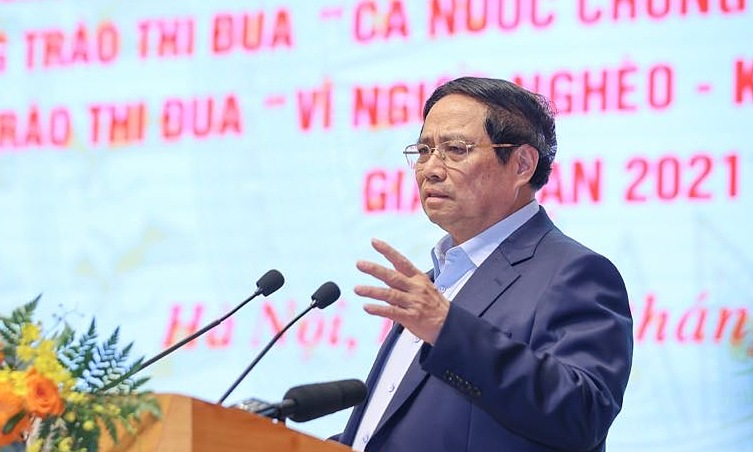 |
Prime minister Pham Minh Chinh speaking at the conference. Photo: VGP |
Prime minister Pham Minh Chinh speaking at the conference. Photo: VGP
According to the Central Steering Committee for National Target Programs, Vietnam currently has 53 ethnic minority groups with over 14.4 million people, inhabiting an area covering about three-quarters of the country. After the two-level local government reorganization, there are approximately 1,516 communes in ethnic minority and mountainous areas across 32 provinces and cities.
The 2021-2030 program has 10 specific projects, with a total investment of over 137,000 trillion VND for the 2021-2025 period. After five years of implementation, six basic task groups have met or exceeded their targets, including poverty reduction, vocational training for working-age people, and the preservation and development of ethnic cultural values.
Son Ha



